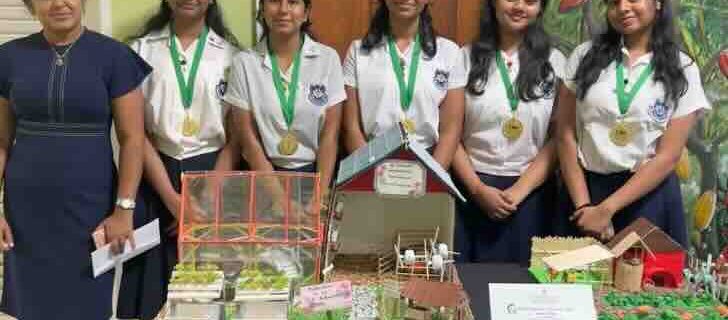On October 16th, 2024, a prize giving ceremony was held at UWI St.Augustine in the Department of Food Production for the Green Innovators Challenge where the NGHS teams, “Eco-Scholars” and “Eco Alive Girls,” secured 1st place and 3rd place respectively in the Eco Artistry Category.
The “Eco-Scholars” team consisted of Ashley Seepaul, Ishta Phillip, Ameerah Beekhoo, Sandhya Roopnarine and Jada Seepersad, guided by Mrs. Ramlogan. They presented a model of a farm with the following elements to create a Sustainable Farming Concept:
Renewable Energy: The farm is powered by solar panels and small wind turbines, providing clean energy for all operations and reducing reliance on fossil fuels.
Greenhouse: A solar-powered greenhouse utilizes natural light and efficient irrigation systems to grow a variety of vegetables and herbs year-round.
Aquaponics System: Integrated into the greenhouse, the aquaponics system combines fish farming (such as tilapia) with plant cultivation. Fish waste provides organic nutrients for the plants, which filter and clean the water, creating a sustainable cycle that maximizes resource use. Using LECA (Lightweight Expanded Clay Aggregate) in aquaponics can enhance sustainability in numerous ways.
Dairy Farm: Grass-fed cows are raised without chemicals or antibiotics, grazing on organic pastures. Their manure is used to enhance soil health and, when composted, contributes to the farm’s fertilizer supply.
Egg Production Unit: Free-range hens are kept in mobile coops, allowing them to forage naturally. They produce fresh, organic eggs while benefiting from a diet supplemented with farm waste.
Organic-Based Fertilizer: The farm produces its own organic fertilizer by composting plant waste, kitchen scraps, and manure from the cows and hens, enriching the soil for crop production.
This model emphasizes closed-loop systems, maximizing resource efficiency, and promoting ecological balance while producing a variety of high-quality food products.
The “Eco-Alive” team consisted of Ambika Persad, Tia Ramnarine, Renée Mohammed and Shanta Ragbir with the assistance of Mrs. Lall-Soobrattee, The mixed media piece was entitled “Real Hunger” which portrayed the current situations that people in Trinidad and Tobago face with food security. In the art piece, a young woman “Madame Caura” is crying as she longs for fresh, good quality food when instead, she is given chemical-ridden produce, harvested from polluted, sick soil. She is positioned like a market scale, where she is weighed down by the unsanitary food. In her other hand, she holds with much gratitude, a pure fruit whose biochemical and nutritious composition provides the best benefits to her.
We would sincerely like to thank Dr. Laura Tardieu and her team at the Department of Food Production, Faculty of Agriculture at UWI St. Augustine for giving us this wonderful opportunity. We wish them all the best in their future endeavours.





